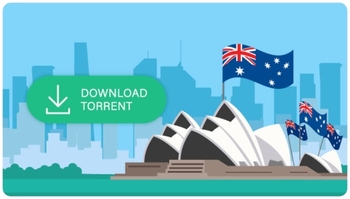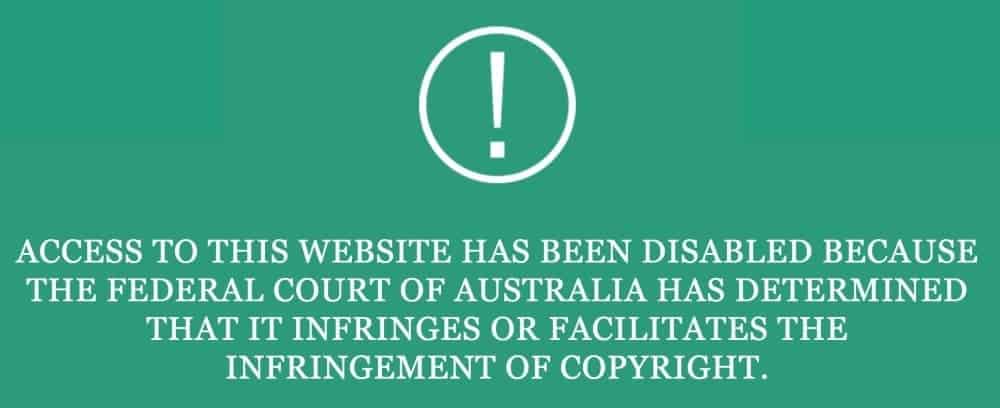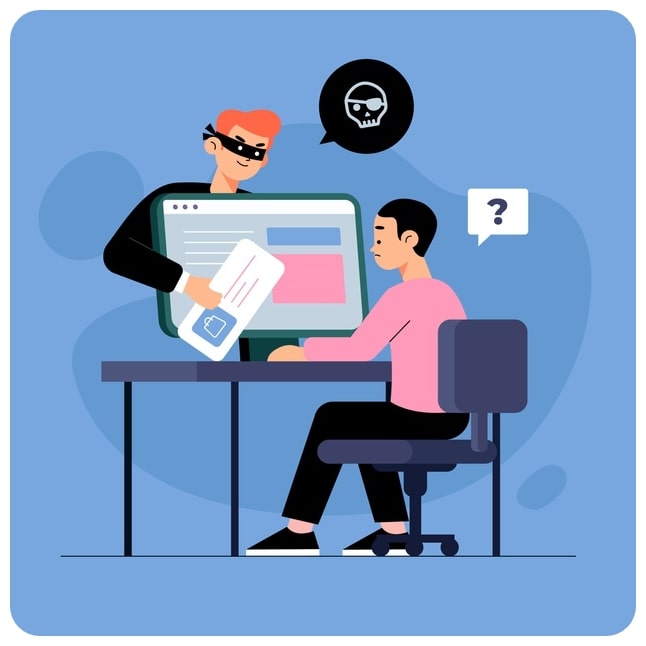Disclosure: Privacy Australia is community-supported. We may earn a commission when you buy a VPN through one of our links. Learn more.
Is Torrenting Illegal in Australia?

One of the bigger debates surrounding the fair use of the Internet and the ease in downloading various copyrighted materials involves torrenting.
But what exactly is parenting and how does it work?
Before we get into more detail, remember that torrenting is a type of file sharing and is thus not illegal right off the bat.
You can get into legal trouble when it comes to torrenting because most downloaded material using torrenting sites is copyrighted by default, so downloading it is technically not permitted.
We recommend you get a decent VPN such as NordVPN and enjoy peace of mind when browsing online. We’ve done all the research at Privacy Australia so check out some of our top picks here.
How Torrenting Works
Regular downloading occurs when you click a button, and a server that hosts the file sends a copy of it to your computer over the Internet. Torrenting is slightly different than this basic process; instead of taking a file from one server and downloading the file wholesale, torrent streams break up a larger file and compress it into several packets.
Packets are originally sourced from a single server called the “seeder”. But many more copies of various packets are shared throughout a network of computers, called “peers” or “leechers” depending on the torrent site you use.
Each additional packet will have slightly different parts of the same original file.
When you download a torrent file, you’re essentially putting together a larger file from a wider collection of servers.
This results in a lower overall network load and means you’ll be able to download larger files even if you have limited bandwidth. The trick is that you’re required to upload your own copy of the file as you download it, meaning your Internet connection may be strained more than usual. Still, the benefits are relatively easy to see.
Torrenting allows you to get your files from a wider host of servers, which lessens the likelihood that the files are filled with viruses (since others are already using them). It also allows you to download larger files without putting too much stress on your Internet connection.
But despite these advantages, torrenting is far from the most popular download format across the Internet. Because of this, the primary currency traded along torrenting networks is the legal or copyrighted material, like movies, music or video games. As a result, many people equate torrenting to illegal Internet activity, even if torrenting itself is not the true issue.
Australia is one of the most infamous countries when it comes to torrenting, largely because a huge proportion of illegal downloads occur within its borders. Let’s dive into torrenting in Australia and its fluctuating legal status.ii
Growing Interest Around Torrenting

Today, the world is arguably in the Golden Age of streaming television. It’s incredibly easy for anyone to access top-tier shows and other programs from the comfort and convenience of the computer, receiving high-definition media in just seconds.
This has allowed many famous TV shows and creators to get worldwide acclaim and attention.
But the trouble with streaming media is that it’s very vulnerable to piracy. The fact that files for shows and movies are constantly shared online makes them easy to steal and spread through copying and torrenting.
It’s a vastly different environment than earlier decades, in which TVs can only be viewed if you had the physical tape or disc. These days, you can get a copy of almost any movie or TV show from a torrenting website; everything has been downloaded to the Internet at one point or another.
Many countries around the world struggle with their populations torrenting media.
Australia is particularly well-known for this illegal phenomenon. A 2015 report by the global accounting firm EY summarized the issue of Australia’s problem with torrenting.
At the time of the report, Australians were the second-most common perpetrators for illegal downloads in the entire world. This is in spite of the fact that Australia has a relatively small population compared to other developed countries: 24.6 million as of 2017.
More examples of Australia’s ironic tendency to lead the world in illegal downloads can be found everywhere. For instance, the finale of the hit TV show Breaking Bad in 2013 had more than half a million illegal downloads within 12 hours. Australia accounted for 18% of those illegal downloads, dwarfing even the United States and the UK.
A 2014 poll indicated that 29% of Australian adults admitted to being active pirates, which meant that they had downloaded at least some illegal media over the last year. It’s easy to see that torrenting is a big part of Australian culture, regardless of its old legality.
Even five years ago, the Australian Atty. Gen. George Brandis said that Australia was the “worst nation for piracy on the planet”. Whether this is true or slightly exaggerated is still up for debate, but there’s no denying that Australia has come under heavy fire for their apparently lax attitude surrounding media piracy.
Fueled by media conglomerates interested in protecting their intellectual properties and a public attempting to appear more respectable in the developed world, recent interest has sparked up once again in the political scene surrounding this debate. It’s resulted in several new piracy laws being enacted or discussed. Let’s jump into those now.
Australian Piracy Laws and Legislation
Many quality ISPs (Internet service providers) who operate in Australia are working their way through the courts as they become vulnerable to copyright claims from film and music publishers.
These lawsuits are attempts to reduce illegal downloading by forcing the ISPs to block certain websites that host torrenting parties. In essence, big media companies know that they can’t possibly stop the millions of people interested in torrenting media illegally, but they might be able to stop ISPs from giving the torrenting websites digital real estate.
These lawsuits or claims rely on basic anti piracy laws currently enacted in Australia. Currently, copyright holders can reference the Copyright Amendment Bill of 2015 (passed in 2018). Roughly summarized, it allows applicants to show that ISPs enable access to online content outside Australia with the primary purpose of making it possible to infringe on copyright.
If you translate this legalese down to simpler words, it means:
- copyright claim applicants can provide that a website is infringing on copyright laws
- the website has to be providing illegal content
- the website must be outside Australia
- the Internet service provider must be allowing regular access to this infringing website
This had the effect of expanding copyright protections and allowed copyright owners to apply for specific injunctions. It made the fight against copyright infringement a lot easier on behalf of copyright owners overall. In addition, it held search engines somewhat responsible for piracy just like ISPs.
The law dictated that search engines could be held responsible if they linked to band sites, as this could theoretically be seen as improving traffic to those sites and increasing the visibility of pirating sites. As a result, search engines like Google or Bing are now being required to remove links from sites like The Pirate Bay, including their mirror sites.
How These Laws Work and Are Enforced

According to Section 115A of the Australian Copyright Act, any applicants wishing to file a lawsuit on copyrighted grounds must apply to federal court in order to enforce the provisions of the act.
This does place a significant hamper on attempts to shut down pirating, as corporations or their legal teams must make it through the often tedious legal process to file an injunction rather than immediately shutting down the pirating sites.
The Australian pay television company Foxtel is currently working to avoid this requirement, however. They were one of the initial media champions pushing for new legislation to stop the prevalence of torrenting and strengthen laws surrounding the prosecution of offending ISPs.
In recent months, they’ve been attending court and trying to allow for the requesting of ISPs to block piracy websites without having to attend court. This will theoretically make the process a lot easier and might speed up the rate at which ISPs must jump on piracy sites.
The major film company Village Roadshow has also been a huge proponent of the new laws, and in pushing them to their limit. As recently as June of last year, Roadshow managed to get 76 overseas video piracy websites blocked by certain ISPs.
Ultimately, it’s the efforts of major companies or organizations like these that drive the continued development of piracy laws in Australia.
Law Details
At this time, Australian ISPs have 15 days to disable access to various domain names that are identified in court orders. For instance, if The Pirate Bay, arguably the most popular torrenting site in the world, is named as a culprit in the breaking of copyright, then ISPs have 15 days to disable access to that website for all of their users.
However, actually enforcing these laws is trickier than it initially seems. There’s usually around six-month delay between claims being filed and courts making a final decision. This gives various pirating sites plenty of time to create “mirror” or clone websites.
If the word spreads around fast enough, the primary users of various torrenting sites can simply transfer to the mirror website and continue with business as usual.
Australian courts do have the ability to review claims of mirror websites under new applications, but this drags down the process even further. Orders that are enacted remain in effect for three years, but this does little when setting up a clone site is relatively easy for the managers of various torrenting platforms.
At this time, an Internet user attempting to access any blocked site will receive a simple message: “Access to the website has been disabled because this court has determined that it infringes or facilitates the infringement of copyright”. In other words, it makes it very clear that the site is no longer available.

But to make matters worse for the courts, many experienced torrenting parties or downloaders know where to look to find alternative torrenting offerings or websites.
While larger film or music publishers can sue individuals who download media illegally, it’s often not worth the cost in finances and time. Most average illegal downloaders don’t have enough money to make suing them worthwhile when you factor in legal costs.
In addition, the Bill has experience lots of opposition from the Green Party of Australia and from the Australian Digital Alliance, which counts both Facebook and Google among its members.
In cooperation with many other universities and digital organizations, they’ve raised concerns that the legislation can remove certain public interest protections and potentially threaten legitimate sites or operations.
As a result of these concerns and general Australian legal processes, the bill was set to be reviewed in two years’ time.
Who Has It Affected?

As mentioned before, targeting individual users or pirating websites themselves is largely a moot point given the huge number of individuals responsible for proliferating pirated content and the ease of creating a mirror site.
However, individuals who willfully download copyright protected content can be sued.
One of the landmark cases in increasing piracy prosecution came when Voltage Pictures, the producers of the movie Dallas Buyers Club, attempted to find a huge number of Australians who had downloaded the movie legally.
Although the case was eventually thrown out in court due to a number of legal technicalities, it demonstrates that individuals aren’t truly safe if they ever illegally download media from a piracy site. Even if that case failed, others may be brought forward and might be more successful.
How Effective Are VPNs and Other Tools to Bypass These Laws?

Despite the surge in antipiracy laws and prosecution efforts, many Australians are still bypassing the laws in accessing illegally pirated content by using VPNs.
Sites that are blocked from Australian ISPs can still be accessed with these systems.
In a nutshell, VPNs allow private networks to extend across the public network, enabling different Internet users to browse freely without their IP address being known by their provider.
This also allows them to simulate being from a different geographic location, such as the US or the UK. Because the sites are only blocked for Australian users, many can still access theoretically blocked pirating sites by using this method.
Many Australians and others who rely on pirated content feel that it’s their right to access that content is not easily available through legal channels. It’s also incredibly difficult for ISPs to prevent people from using a VPN to visit sites.
By their very definition, VPNs mask IP addresses and traffic. The only way to theoretically stop VPN users from reaching piracy sites is to stop VPNs from being used altogether.
As a result, many countries are banding together to stop the use of VPNs. Russia, as an example, has been signing new bills that will allow for lists of band domains to be kept by telecommunications companies.
Those companies can then contact operators for VPN or ISP services and command them to stop providing access to those websites regardless of the geographic location (or supposed geographic location) of the users. This also extends to search engines.
It may be that this is the way of the future and VPNs will only be effective for those trying to circumvent antipiracy laws for a short while longer.
After that, pirates may need to rely on the Tor browser and even more in-depth methods of masking their traffic in order to access their favorite pirating sites. However, for now, getting a high-quality torrenting VPN will be enough to ease your worries about the law.
In their worst-case scenario, a pirating website may be banned from search engines or from the Internet at large eventually. But this still seems a long way off, given the legal difficulty of enacting such a measure and the ease of which pirates can make a new copy of the site. It may stop new people from finding the website but do little to stop repeat pirates from downloading new content.
Conclusion
All in all, the torrenting discussion in Australia reflects the global one. Most people seem to believe that torrenting media content illegally is bad, and many people assume that any torrenting must automatically be legal.
Though this is not the case, torrenting websites could come under fire in the future in more permanent ways. The Golden Age of digital piracy may be ending, and it’s hard to know if that’s a good thing.
While torrenting is not entirely illegal in Australia, it is important to note that its future legality is uncertain, and the ease of accessing well-known torrenting websites like The Pirate Bay has significantly diminished over time although always possible to use them, using a good VPN.



